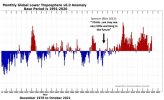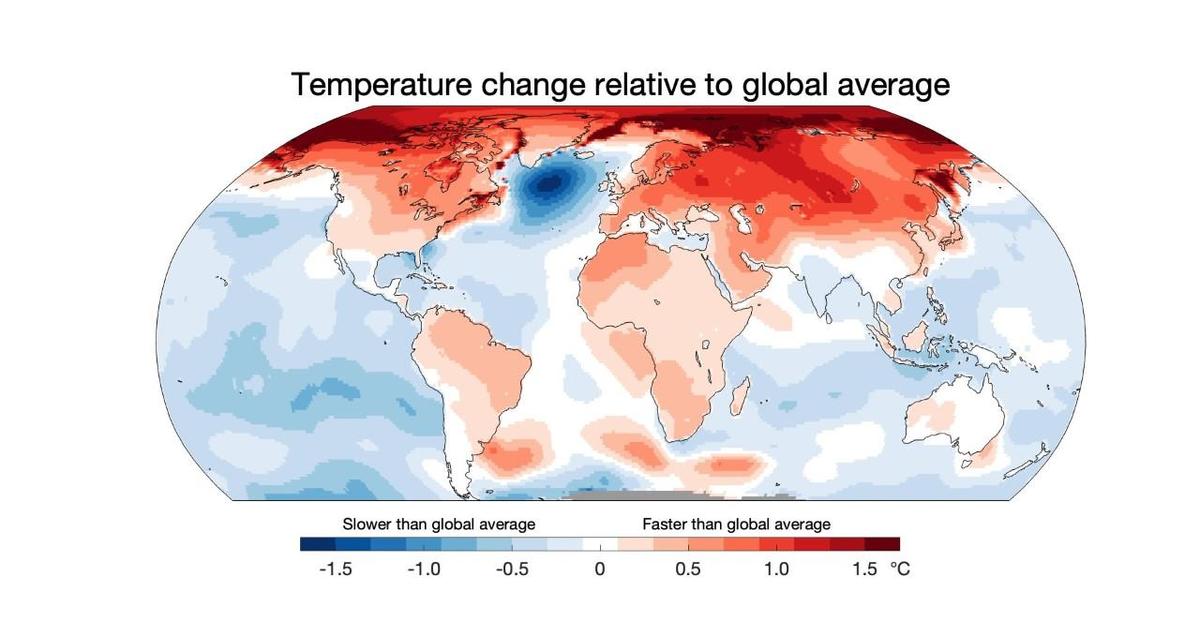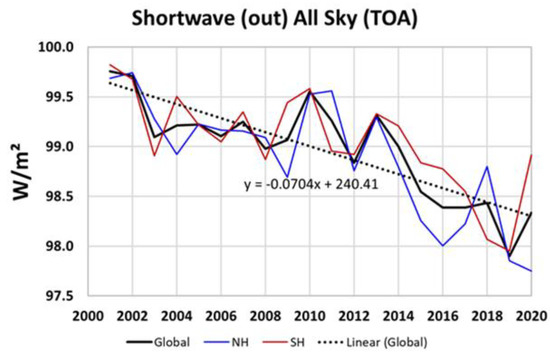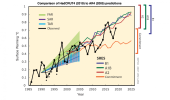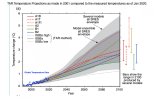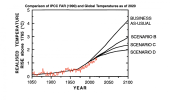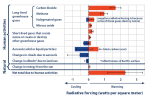It is easy to see that the people who believe in AGW and the nebulous negative feedback mechanisms
The climate science community is well aware of those mechanisms and they've been discussed ad nauseum in literature and IPCC reports (which I assume neither of which you've read or care to know about, but it's linked above if you ever want to read) including but not limited to sulfuric aerosols, clouds (the sign of the feedback here depends on depth, height, and opacity), but they're nowhere near strong enough to offset the positive feedbacks that are mostly due to manmade greenhouse gas emissions, which are causing temperatures to continue to warm to this very day.
Dr Spencer has offered to debate ANYONE in the Atmospheric Sciences field who disagrees with him but has strangely gotten no takers."
This is just complete nonsense. He's already been in
very heated debates even with his own colleagues and lost very handily and been exposed repeatedly as at minimum completely aloof and dishonest or at worst a political hack (the latter which is entirely consistent with his affiliations to conservative think tanks and big oil shown above). Let me just give you a few examples that come up w/ a quick google search.
http://www.drroyspencer.com/2009/11/my-top-10-annoyances-in-the-climate-change-debate/
In this article, Spencer suggests the climate sensitivity may be low, due to mainstream climate scientists underestimating clouds, and he claims that satellite data will support him.
Rebuttal: "Roy Spencer has come up with yet another “silver bullet” to show that climate sensitivity is lower than IPCC estimates. I.e., he fits a simple 1-box climate model to the net flux of heat into the upper 700 m of the ocean, and infers a climate sensitivity of only about 1 °C (2x CO2).
There are several flaws in his methods–inconsistent initial conditions, failure to use the appropriate data, and failure to account for ocean heating deeper than 700 m. (He fixed the last one in an update.) All of these flaws pushed his model to produce a lower climate sensitivity estimate.
When the flaws are corrected, the model estimates climate sensitivities of at least 3 °C, which is the IPCC’s central estimate. ... while Spencer’s latest effort doesn’t really do any damage to the consensus position, it turns out that
it does directly contradict the work he promoted in The Great Global Warming Blunder."
He contradicts himself you'll find that's a pretty common theme w/ some of his extravagant claims in the last 15-20 years
"My long term prediction is that eventually we are going to realise that more CO2 in the atmosphere is actually a good thing"
Yeah, this claim is aging like spoiled milk. But again, I'm of the notion that the real crux of the issue is it's really not the amount of CO2 necessarily that's the leading issue (it's still a problem), it's how fast it's being put into the atmosphere by manmade activities, which makes adaptation to the very rapidly changing climate (1-2 orders of magnitude faster than the PETM, which killed off ~40% of Marine Benthic organisms) damn near-impossible. Humans are creatures of habit and when you force their hand to change their ways extremely rapidly, it's going to be very costly and for most non-developed countries that don't have deep pockets like the United States and can't afford the kinds of adaptation measures it'll take to adjust to the new climate we've created for ourselves.
In another paper Spencer published in 2011, in
Remote Sensing (which isn't a journal for atmospheric scientists btw, which is a concern since the reviewers are really not experts in the field of climate science and meteorology, often not exactly making the best judgement calls on suggestions for revisions, etc), he tried to claim the warming was being potentially caused by clouds (spoiler alert: it was not)
Errors identified by climate scientists "...range from the trivial (using the wrong units for the radiative flux anomaly), to the serious (treating clouds as the cause of climate change, rather than resulting from day-to-day weather; comparing a 10 year observational period with a 100 year model period and not allowing for the spread in model outputs)."
[31]"Within three days of the publication of Spencer & Braswell 2011, two climate scientists (Kevin Trenberth & John Fasullo) repeated the analysis and showed that the IPCC models are in agreement with the observations[27], thus refuting Spencer & Braswell’s claims. An independent analysis by Andrew Dessler also confirms the Trenberth & Fasullo result
Continuing on w/ said paper
In Andrew Dessler's view, "[This] paper is not really intended for other scientists, since they (climate scientists/his own peers) do not take Roy Spencer seriously anymore (he’s been wrong too many times).
Wow, doesn't this sound familiar, it's almost as if I've said this at least once in here over the past few days.
Rather, he (Dr Spcener) is writing his papers for Fox News, the editorial board of the Wall Street Journal, Congressional staffers, and the blogs. These are his audience and the people for whom this research is actually useful — in stopping policies to reduce GHG emissions — which is what Roy wants.
Huh, isn't that a freaky coincidence. /s
In fact, the backlash on said paper above from actual climate scientists was so bad that the chief editor resigned. Not exactly a good look for your boy Dr Spencer there huh.
"In Sept 2011 Remote Sensing editor-in-chief Wolfgang Wagner resigned, saying that the paper should not have been published - that while "[peer review is] supposed to be able to identify fundamental methodological errors or false claim"
In the end, it's a vicious cycle w/ nonsensical literature like this
Michael Ashley noted that this paper was following the same trajectory as previous papers touted as demolishing global warming, that haven't stood up over time:[31]
1. The article is published in a non-mainstream journal, following inadequate peer-review.
2. Press releases from the authors exaggerate/distort the contents of the article to inflate its significance and increase the attention given to it.
3. News of the article spreads like wild-fire around the blogosphere.
Remember that misinformation and falsehoods such as Spencer's 2011 paper spread faster than actual, real science (again not a shocker here).
4. Some media outlets take the press release and exaggerate it further still, so that the information that finally reaches the public has almost no relation to the original article.
This has been happening since the dawn of major news media outlet sources (& arguably much earlier than that). Fox News, CNN, MSNBC, and other major news outlets are all guilty of this, not just when it comes to climate change, information and headlines that common folk like yourself who have no real idea what climate change (or other topics) are really about, read sensational headlines and extravagant claims to polarize the issue further, increase ratings, and sell newspapers, and misleads you from reality.
5. Within days, experts in the field show that the original article is fatally flawed; but by now the damage is done.
You don't have to look very far or even just at climate change to see this happen in real-time, space news is just as bad, sometimes worse w/ the lengths some news organizations go to exaggerate said claims of newly found terrestrial life, earth-like planets, etc. which often get shot down by real experts in the field, only for the rebuttal to not spread like the preceding misinformation.
6. For years into the future, the article is quoted by deniers of human-induced climate change as evidence that the science is uncertain.
Anyone that scrolls through this very thread, which spans the last 4 years or so, will see this time & time again.
But I digress, let's continue on w/ examining Roy Spencer's track record
Spencer and colleague John Christy "published a series of papers starting about 1990 that implied the troposphere was warming at a much slower rate than the surface temperature record and climate models indicated..."; but the discrepancy turned out to be an artifact of their having applied incorrect adjustments to their UAH satellite temperature record data.[38], [39]. As Ray Pierrehumbert at RealClimate put it:
How convenient that is. It's almost like they were purposely trying to get a desired result to support a political agenda (big if true!)
"Spencer and Christy sat by for most of a decade allowing — indeed encouraging — the use of their data set as an icon for global warming skeptics. They committed serial errors in the data analysis, but insisted they were right and models and thermometers were wrong. They did little or nothing to root out possible sources of errors, and left it to others to clean up the mess, as has now been done
Not surprised in the least.
Whilst a critic of the Intergovernmental Panel on Climate Change Roy Spencer has also been a contributor. He helped draw up Chapter 7. Physical Climate Processes and Feedbacks of the Third Assessment Report [42] and contributed to Chapter 3: Observed climate variability and change
Wow, good for you Spencer, at least you did something amicable here (see I'm not trying to just lambast the guy, but just show you there are two sides to this story, one of which you are purposely throwing under the rug). Look, no one in the community denies Spencer's work in the 80s and 90s and remote sensing, he was a pioneer in the field and should be commended for it. However, he became convinced that AGW was a farce sometime in the late 1990s (which wasn't a super extreme stance to take back then, but become increasingly fringe w/ time as the amount of literature and real-time observational evidence has built up against him and his pet hypotheses which are continually shot down by his peers) and has stubbornly not evolved his position over time (very much like crazed Joe Bastardi, whom I used to adore, but realized he's completely lost it (much liek Spencer) (can't teach old dogs new tricks I guess), and Spencer has since become a mouthpiece for right wing political organization and big oil companies (such as Exxon-Mobil). Just really sinks your credibility as an honest scientist when you're backed by political organizations whose main goal is to push a specific agenda and misconstrue/mislead public messaging. It's honestly sad really.
But hey let's continue on shall we.
From Dr Spencer (Mar 22, 2012): "there's no way to get rid of the CO2."
Source WUWT
https://wattsupwiththat.com/2012/03/26/dr-roy-spencer-on-foxs-john-stossel-show/
Wow talk about bold claims that are aging extremely horribly before your very eyes. Not only are current technologies enough to curb emissions from where they were before w/ increasingly fuel efficient vehicles, electric vehicles, etc, but even big oil companies like
Exxon-Mobil are introducing carbon capture technology to physically remove CO2 out of the air. This claim is nothing short of a massive blunder by Spencer, especially when the organizations he's working for are doing the very thing he said couldn't happen.
From Dr Spencer (Mar 2012) "I think...we may see very little warming in the future"
Source WUWT
https://wattsupwiththat.com/2012/03/26/dr-roy-spencer-on-foxs-john-stossel-show/
From Dr Spencer (Mar 2012): "for some reason it stopped warming in the last 10 years, which is one of those dirty little secrets of global warming science"
Source WUWT:
https://wattsupwiththat.com/2012/03/26/dr-roy-spencer-on-foxs-john-stossel-show/
Talk about hot takes/bold claims that definitely didn't age like fine wine, the near-decade since this quote, every year of the last 6 has been warmer than 2012 and there is unfortunately no sign of it slowing for a significant period of time.
Even when you use his own dataset, the timing of these statements couldn't have come at a worse time for Spencer's credibility, & not surprisingly he couldn't have been more wrong on both accounts.
View attachment 96478
Dr Spencer (also from Mar 2012): "the warming trend over the Northern Hemisphere, where virtually all of the thermometer data exist, is a function of population density at the thermometer site."
If he even looked at his own work, it wouldn't have taken him long to realize the warming is occurring the fastest in sparsely populated areas of the Arctic where few people actually live, so his point about population and urban sprawl mainly accounting for the temperature change is completely and utterly false, and shows he's either purposely misleading you are doesn't actually understand what's going on (or both).
Benestad et al (2016) is a pretty good read for those interested in some of the issues w/ "contrarian" papers. Most of the issues stem from poorly constructed hypotheses, data fudging (as Spencer has been known to do), inappropriate statistics, inaccurate physical assumptions, over-fitting/curve fitting, and missing contextual information that would lead you to an entirely different conclusion. And before anyone says "bUt tHe sCieNcE iS nOt sEtTlEd", coming straight from the horse's mouth:
We also argue that science is never settled and that both mainstream and contrarian papers must be subject to sustained scrutiny. The merit of replication is highlighted and we discuss how the quality of the scientific literature may benefit from replication.
https://link.springer.com/article/10.1007/s00704-015-1597-5
As for EV's, just where are we going to store the billions of batteries it will take to go electric let lone the corrosive effect that these batteries will have?
We've long since figured out how to properly handle and safely store much more dangerous/hazardous nuclear waste (for decades), I don't see how this is somehow going to be a major issue overall.
Good luck when you have to go on a trip of say 600 miles or get ready to board an airplane, because charging has to occur very frequently not to mention the extra time that charging will take on that trip.
Once again this statement shows you're pretty misinformed and out-of-touch with most of the latest technological advancements and your claim of inconvenience to the traveler at best a huge reach. For one thing, most combustion engine vehicles, when carrying more than one passenger rarely have a range over 400 miles, my vehicle doesn't go over 300 miles with one other person in it, so I'll at least have to stop just for gas no less than 2 times on my way to said location. Unless you have a hybrid, which can push closer to 500 miles on a very good day & again closer to 400 with multiple passengers in the vehicle, if you're going on a 8-10 hour car ride that'll take you 600 ish miles, you're probably going to want to stop more than once for bathroom breaks, stretch, meals, sight seeing, rest stops, etc. so this is a pretty moot point.
There are already over 42,000 charging stations in the US and 5,000 "fast" charging stations, with the number from some companies expected to double in just the next 10 years alone. It takes 20-30 mins to get a "good" charge of 200 miles from a fast DC charging station and that'll likely only get faster as the technology continuously improves and is innovated by private sector companies. I'd hardly consider that super inconvenient in the next several years as I've stated above, when that number may get pushed down closer to 15 mins which isn't all that crazy for the amount of time it normally takes for a pit stop at a gas station. For some that are very on-the-go, it may not be the best option right away, but most people can't reasonably drive more than several hundred miles in a day, so it's pretty reasonable for a majority of consumers.

en.m.wikipedia.org

